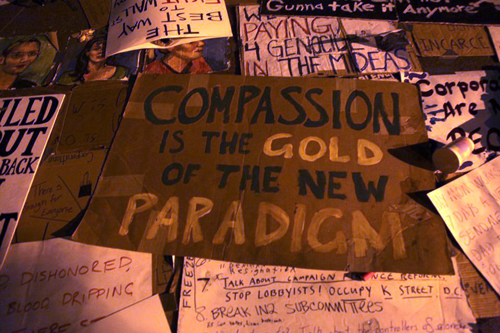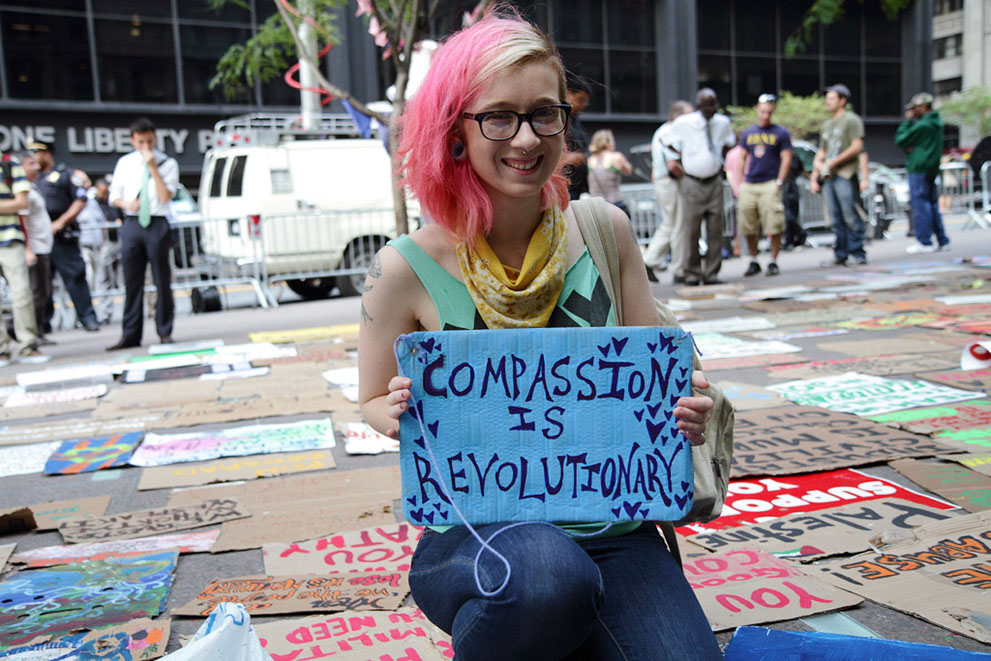Conservative reactions to the Wall Street protests have been hilarious, even if you don’t think of where they were with the Tea Party. House majority Leader Eric Cantor called the demonstrations “mobs,” as if he were wearing spats. Herman Cain said they shouldn’t blame the banks but only themselves, the losers who had failed–conveniently forgetting that it was the banks that failed, not the workers and students who are paying for the bailout. David Brooks chided the movement for being “small thinkers” who lack big ideas. Frankly, a just, equitable, sustainable democracy is a pretty big idea, but I’ll let that go, because a lack of ideas has nothing whatsoever to do with the current crisis. Instead, perfectly adequate ideas are being blocked at every turn by a Republican party determined to defeat Obama, destroy financial and environmental safeguards, and otherwise continue to serve the lords of capital. Small minds–and small hearts–are a problem, but it helps to get the names right.
And when all else fails, the pundits have insisted that the demonstrators are merely venting emotion, because they lack an agenda for getting out of the economic crisis. That criticism is not only lame, but just wrong. In fact, the New York Times had no trouble figuring out exactly what issues were on the table–and the Times is not exactly one of the hip new media sites. But even so, the choice need not be between protest and policy or emotion and reason. Maybe there is something else at stake.
There are many reasons to question whether the recent protests in the US–and, perhaps sadly, elsewhere–are revolutionary. In fact, it’s easy to mock them on those terms. More seriously (and as I’ve suggested before), there are good reasons to question whether those should be the terms for social and political change in the 21st century. That’s one reason I like this sign: “the new paradigm” may not be a slogan to die for, but you get the idea that we are talking about something beyond policy fixes. I’ll leave it to David Brooks to measure the size of the thinking (although see Novus Ordo Seclorum), but the idea is that if the principle of compassion were really taken seriously, we could have another refounding of American democracy to achieve a better, more decent society. (One also thinks of Gandhi’s comment when asked what he thought of Western Civilization: “I think it would be a good idea.”) But why compassion?
Neo-conservatives have been bashing compassion and (most recently) “empathy” for a couple of decades, so that’s one clue. (Their hostility to the ideal is a telling marker of their radical departure from the conservatism of Edmund Burke, and no less a figure than Adam Smith argued that compassion was the most important “moral sentiment” and essential if a capitalist society was to avoid descending into vicious self-destruction.) I can’t cover all the philosophical and political issues here, but suffice it to say, in a society given over to greed and arrogance, compassion could be a revolutionary idea.
Photographs by Velcrow Ripper and Paul Stein. Slides shows on the demonstrations are here, here, here, and elsewhere, if you want to dig around.
Cross-posted at BAGnewsNotes.


Compassion and empathy are part and parcel of Jeremy Rifkin’s The Third Industrial Revolution, especially Part III, The Collaborative Age. In the western world, compassion and empathy are a kind of feeling/emotion whereas in the eastern world (especially India, China, Japan) they are based on chi which gets translated into English as pneuma (vital spirit, soul, creative energy) or something that is difficult to define as it cannot be seen or measured. For those who experience chi, it’s so obvious there’s no point in discussing the subject.
However, having studied this phenomena at the School of Hard Knocks, in my experience/opinion while most westerners don’t experience chi and most easterners do is somehow related to a particular rib anomaly (there are many such anomalies), namely a floating tenth rib. Most westerners don’t have the anomaly, while most Japanese (and probably other easterners) have the anomaly.
First of all, I love this blog. Thank you for doing the dirty work of actually deeply experiencing photography.
This post is excellent – compassion is at the core of the movement, but when I was at the Seattle protests on Sunday I felt compassion was being shoved aside by Marxism.
I wrote the following at my blog:
One of my favorite ideas from Marxism is this idea that we are alienated from the outputs of our labor. Money has made our labor abstract, intellectual, so there’s no physical sense of the work we do. According to Marxism, in order to fully realize ourselves we need to stop doing work that’s abstract and start practicing work that’s an expression of our relationship with the chosen material – that is, work we can experience with our senses. Less head, more heart.
Marxists fall short, though, because they fail to take the idea out of the economic realm and apply it to the social realm. Characterizing a person as an opponent (say – as the 1%) objectifies and abstracts their humanity (and in doing so, it does the same to us). In order to fully realize ourselves, we need to practice compassion, even toward our enemies. Less head, more heart.
It’s sad that we have reached a state where compassion is a revolutionary idea. Political theorists since Aristotle have argued for a form of political friendship and mutual respect. I think Danielle Allen’s work in Talking to Strangers makes a great case for the need to cultivate feelings of friendship and reciprocity.
While I like the idea of compassion, I also want to point out that for Susan Sontag compassion is the feeling of impotence–being overwhelmed by the enormity of the situation and what political action would take. The OWS movement excites me but also overwhelms me–maybe this is the compassionate feeling that has spread the movement to other geographic locations.
Compassion is not an easy ideal, and while I can understand the motivation for the criticisms on the left, I think they are one-sided and have cut progressives off from one of their most important resources for thought and action. As for Sontag, she’s just wrong; the better version of that argument comes from Arendt, but it also can’t stand up to scrutiny. Gandhi wasn’t paralyzed, or ML King, etc. If you’re interested, I say a bit more about the concept in a short essay on “Cultivating Compassion as a Way of Seeing,” Communication and Critical/Cultural Studies 6 (2009): 199-203. As for civic friendship and reciprocity, I’ve long been for it (and assign Allen’s book). There are problems there as well, however, as Obama’s negotiations with the GOP make abundantly clear. Fortunately, one need not have to choose between friendship and compassionate action, but both may need to taken to the streets.
[…] The first is a short blog post by Robert Hariman in which he discusses the extent to which we should see the #OWS protests and their ideas of […]